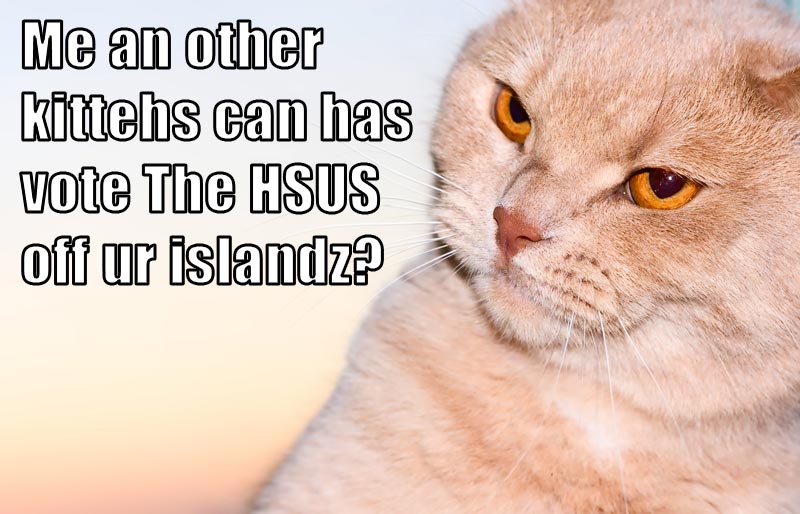Oklahoma and the Rest of the HSUS Election Roundup
If you’re reading this, chances are you already know Election Day is tomorrow. And you're probably also hyper-aware that the “Humane Society” of the United States has a stake in oodles of outcomes, including the re-elections of four Members of Congress (1 | 2 | 3 | 4) and a U.S. Senator.
There’s been an insane amount of media coverage focused on four HSUS-related ballot questions—which isn’t really fair, since there are actually five biggies in play for Team HSUS out of the 160 state-level questions on tomorrow’s ballots.
Easily half of the HSUS-related ballot stories out there have been about the animal rights group's favored ballot measure in Missouri. Most "animal people" also know HSUS is writing six-figure checks to influence outcomes in Arizona and North Dakota. And HSUS is also backing a Proposition in California this year.
That’s four.
Everyone’s forgetting about Oklahoma.
Here are those first four ballot questions, the ones most HumaneWatchers are already familiar with:
- Arizona: Proposition 109 was triggered by the passage of Arizona House Concurrent Resolution 2008. If voters approve it, the right to hunt and fish will be enshrined in the state’s Constitution. The state legislature will have the sole authority to regulate these activities. And it would become a matter of law that “public hunting and fishing are [the] preferred means of managing and controlling wildlife.” The animal rights movement, personified by HSUS, wants a “no” vote. Is anyone surprised?
- California: Proposition 21 would add $18 per year to the cost of registering your car, and set aside the estimated $500 million annual haul to run the state parks and beaches. It’s unclear whether or not California’s fragile finances can withstand a big round of ballot-box budgeting, but supporters have out-fundraiser opponents by a huge margin. The animals rights and environmental movements are strongly behind this. HSUS wants Proposition 21 passed in the interest of promoting “wildlife conservation and habitat protection.”
- Missouri: Proposition B is the punish-the-dog-breeders proposal on which HSUS has spent at least $2.18 million. It’s ludicrous to suggest that the proposed measure—which would actually weaken some parts of the existing state law—will do much of anything, other than putting a host of breeders on the unemployment line. What’s needed more is a windfall of money to support enforcement of the laws on the books. It’s hard to imagine how Proposition B would actually cause the true puppy-millers in Missouri to straighten up. If enforcement is as lax as we hear it is, and no one is proposing a funding source for more inspectors, why would anything change? HSUS is putting its reputation on the line for a “yes” vote on this one.
- North Dakota: Measure 2 would ban so-called “high fence hunting,” an activity that’s rare in North Dakota already. It often involves huge private game reserves, sometimes more than 5,000 acres in size. The legal language of the proposal makes it a crime to be paid by anyone to hunt “privately-owned big game species or exotic mammals confined in or released from any man-made enclosure designed to prevent escape.” We get the “confined in” part. But the “released from” language is puzzling. Let’s say scientists captured and tagged some deer (for disease-tracking purposes), and “released” them “from” a fenced-in research facility. Would those animals suddenly be illegal for private citizens to hunt throughout the state? HSUS wants this to pass. It would be one more baby step toward making all hunting illegal.
And then there’s Oklahoma. For those of you non-Sooners out there, these poor schlubs are going to be facing eleven separate ballot questions tomorrow—more than voters in any other state. (Voting? Pack a lunch.) So it would be easy to let little ol’ “State Question 750” slip through the cracks.
SQ 750 would amend the Oklahoma Constitution to change the number of signatures that it takes to get an initiative or legislative referendum on the ballot. Currently, it’s a percentage of Oklahomans who voted in the last general election. But this new proposal would tie that percentage to vote totals from the last governor’s race.
The present system in Oklahoma is subject to some upswings and downswings, since more people tend to show up to vote during Presidential election years. Oklahoma’s governors, however, are only elected in mid-term election years. So SQ 750 would effectively fix the signature requirements at the low end of the current scale.
Which would be very good news for the Humane Society of the United States.
Making animal agriculture more expensive is among Wayne Pacelle's top goals, but getting an animal-rights proposal on the ballot in Oklahoma—a big cattle ranching and pork farming state—is a steep climb. This measure would make it a whole lot easier.
So why hasn’t Pacelle been beating the bushes for Question 750 in Tulsa, Stillwater, and OKC? Probably because hard-crusading vegans aren't exactly welcome in most parts of the state. And while August polling showed the “No” votes just five points ahead, that number ballooned to 20 percentage points by mid-October.
Still, monkeying with the requirements for putting a potential new law on the ballot would be a great way for HSUS to quietly sneak into the process via a back door. If Oklahoma SQ 750 should manage to pass, HSUS will probably claim victory. If not, don’t expect the animal rights group to utter a peep. Wayne doesn’t like backing losers. Not publicly, anyway.
No matter where you are tomorrow, or what your politics are, HumaneWatch urges you to VOTE! If you don’t vote, you don’t count.
Note: HumaneWatch is a project of a respected 501(c)(3) nonprofit organization that does not take positions for or against political candidates, and errs on the side of caution by not making “Yes” or “No” recommendations on ballot measures. This is not an endorsement of any particular candidate or ballot-issue campaign.




